| Although
the Essoldo, Bethnal
Green will always
hold a special place in
my memory, my dealings
with the cinema were not
always pleasant. At first
our relationship was
decidedly rocky. The
first film that I saw
here was Easter Parade.
I can’t remember why
my parents chose this
cinema to see this film,
as we generally saw MGM
and Warner
Brothers’
musicals at the Empire,
Mile End Road.
Be-that-as-it-may,
whatever the reason why
we saw this film at this
cinema, we did, and I
remember being decidedly
unimpressed with the
décor of the place. The
interior of the Essoldo
had certainly seen better
days by this time, but
then my visit occurred
after the end of World
War II when building
materials were scarce and
not readily available for
cinema renovation. I
remember that the seats
had lost their plushness
and some were broken. The
original wall decoration
had long since lost its
lustre and looked
decidedly unattractive.
This was especially sad
since, judging by
photographs of the
auditorium in its early
days, it had been quite
special. 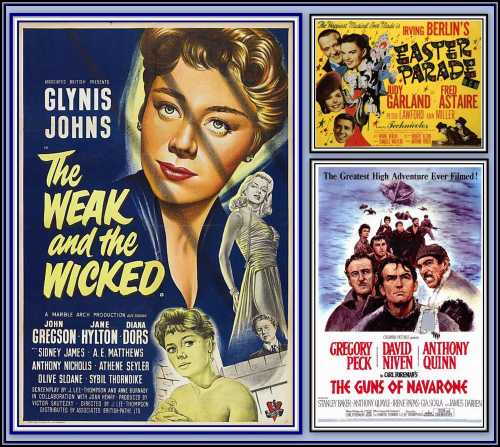
Sometime
later, I went to the
cinema a second time.
This time I saw The
Weak and the Wicked.
This was a British film
made was in black and
white, two qualities that
I failed to appreciate as
a child, I am sorry to
say. Time and experience
has taught me the value
of both old British films
and those made without
colour. Sadly, I have
learned that often my
initial response to
things is without merit
and at times naïve. I
have often dismissed
numerous plays, musicals
and films as being bad or
worthless only to find at
a later viewing that it
was my initial review
that was worthless and
without merit. Although I
doubt if The Weak and
the Wicked could ever
be classified as a
sterling production,
since I am able to recall
the storyline in some
detail, I think that it
was perhaps of more value
than I initially thought.
The film was directed by
J. Lee Thompson, later of
The Guns of Navarone fame
and starred Glynis Johns
and Diana Dors. The story
dealt with their journey
through the prison system
and after their release.
Although I disliked the
film as a child, I regret
that it is not available
for home viewing, as I
would like to see it
again, if only to confirm
my initial impression.
Even though I cannot say
that I enjoyed the film,
I was impressed by Ms
Johns’ voice and Ms
Dors’ curves.
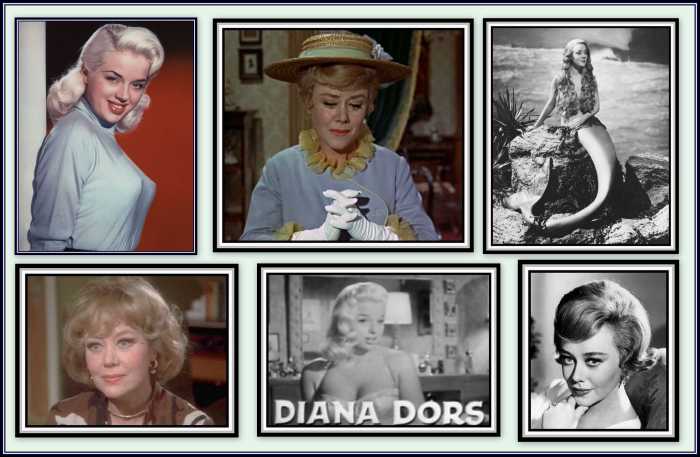
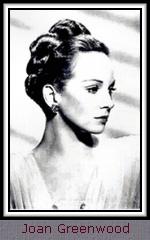 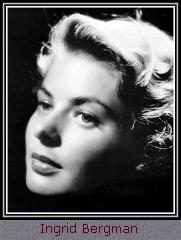 I
have always found Ms
Johns to be an enchanting
and ethereal actress.
Like Joan Greenwood, it
was her voice that first
appealed to me. Even as a
child, and without
realising it, I found it
to be sensual. I always
felt that she sounded as
if she was about to cry.
This is a quality that I
find most attractive and
it caused me to fall in
love with Ingrid Bergman
and probably with Ms
Johns too at an early
age. I was lucky enough
to see her on the London
stage with Keith Mitchell,
sometime in the late
1960s, in The
King’s Mare, where
she played Anne of
Cleves, one of the
wives of Henry VIII.
Although the play was not
memorable, Ms Johns was
and I enjoyed hearing her
deliver her lines. In
1973, I saw Ms Johns once
more. She was starring on
the Broadway stage in the
Stephen Sondheim musical
play, A Little Night
Music. I had gone to
see this production
firstly because of a wish
to see Ms Johns once more
and secondly since the
play was based on the
Ingmar Bergman film, Smiles
on a Summer Night.
Being a devotee of the
Bergman brand of gloom
and despair and an
intellectual snob at the
time, I could hardly miss
this opportunity.
Besides, in those days
theatre patrons were able
to buy a balcony ticket
for two dollars! I
have always found Ms
Johns to be an enchanting
and ethereal actress.
Like Joan Greenwood, it
was her voice that first
appealed to me. Even as a
child, and without
realising it, I found it
to be sensual. I always
felt that she sounded as
if she was about to cry.
This is a quality that I
find most attractive and
it caused me to fall in
love with Ingrid Bergman
and probably with Ms
Johns too at an early
age. I was lucky enough
to see her on the London
stage with Keith Mitchell,
sometime in the late
1960s, in The
King’s Mare, where
she played Anne of
Cleves, one of the
wives of Henry VIII.
Although the play was not
memorable, Ms Johns was
and I enjoyed hearing her
deliver her lines. In
1973, I saw Ms Johns once
more. She was starring on
the Broadway stage in the
Stephen Sondheim musical
play, A Little Night
Music. I had gone to
see this production
firstly because of a wish
to see Ms Johns once more
and secondly since the
play was based on the
Ingmar Bergman film, Smiles
on a Summer Night.
Being a devotee of the
Bergman brand of gloom
and despair and an
intellectual snob at the
time, I could hardly miss
this opportunity.
Besides, in those days
theatre patrons were able
to buy a balcony ticket
for two dollars!
By this
time Ms Johns had
received success in
Hollywood. She had been
totally captivating in The
Sundowners, adequate
in Mary Poppins
and completely wasted in
her television show. As
with The Weak and the
Wicked, I disliked A
Little Night Music
intensely. However I did
find Ms Johns to be
charming and again
enjoyed hearing her
deliver her lines, which
was certainly something
more than I was able to
say about the other
performers. I remember
being pleased that I had
not spent more on the
price of my ticket.
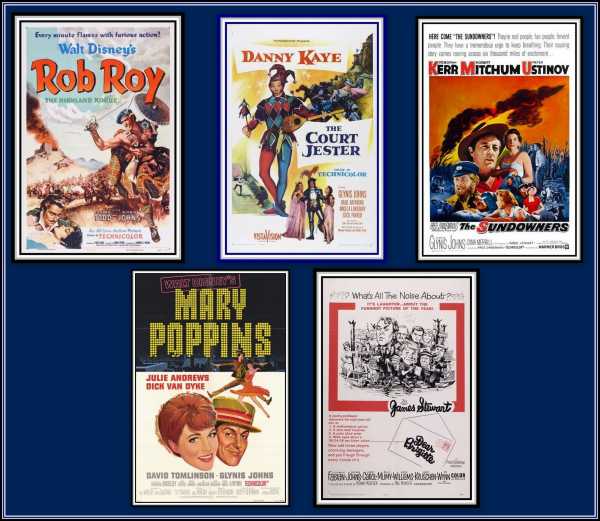
One final
point of note about Ms
Johns
and A
Little Night Music:
whenever I think of this
production, I cannot but
laugh uncontrollably for
a few minutes since I
remember an ex-friend of
mine saying that the
problem with this musical
play was that it lacked good
toe-tapping tunes!
Although I did not admit
it, I heartily agreed
with this remark at the
time. Sadly, I found the
tunes to be miserable!
Although I still laugh at
this dismissal, time and
experience have taught me
the folly of my ways and
I have learned to
appreciate the depth and
pathos of many of the
tunes including Send
in the Clowns,
which I had misunderstood
and believed that she was
asking for someone to Send
in the Clouds!"

|